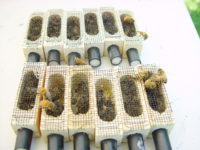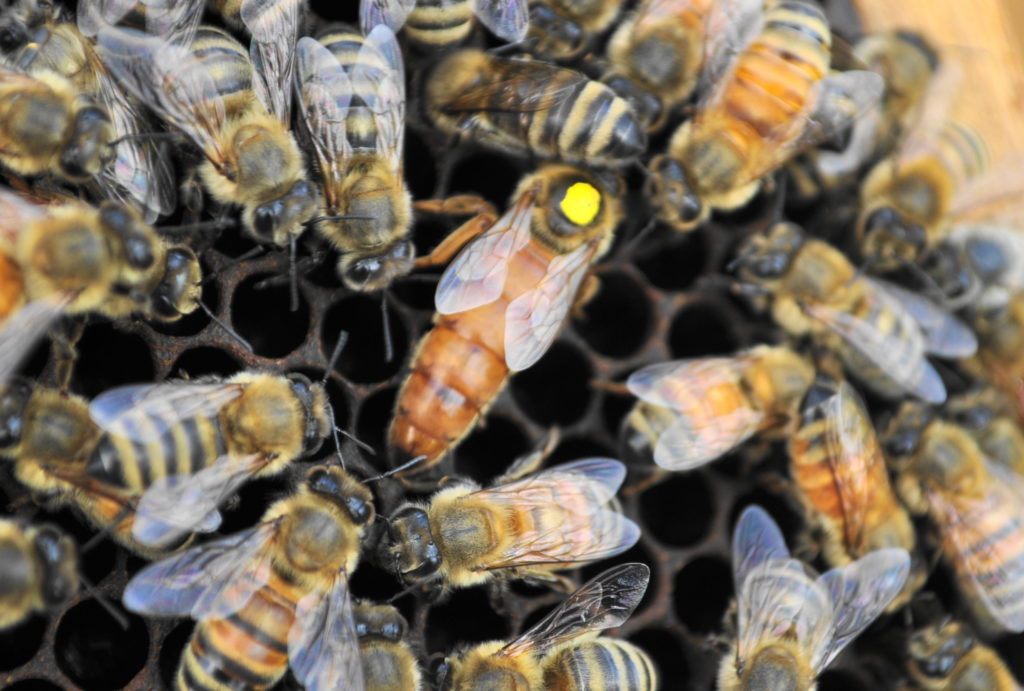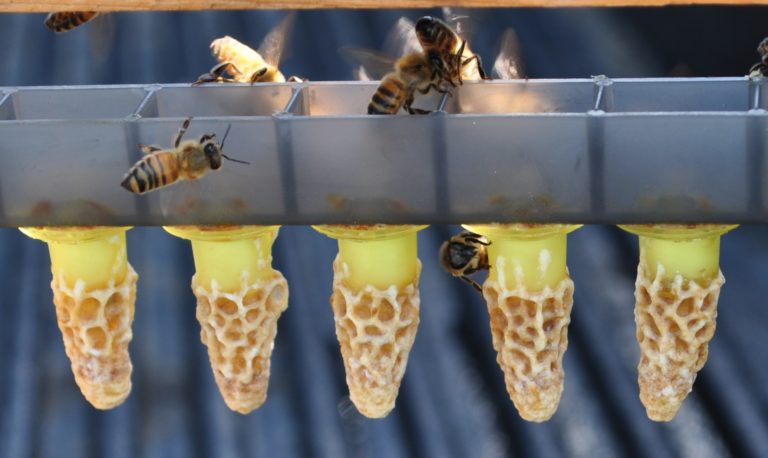We have sold out of Nucs for the season. June Queens are available for pickup at our South Deerfield, Massachusetts Apiary. We are not shipping Queens at this time of year. Queens can be picked up on Wed. or Sat. 9 AM – 12 noon. Please call 413-665-4513 or email warmcolorsapiary.net to confirm the number of Queens and a preferred pickup day. All Queens are RHBA (Russian) and are marked green.
- $40. per Queen.
- $70. laying Queen on a frame with brood. When available. Please order in advance.
- If you need Queens at times not listed, please confirm we are available before making the trip.
No order form is required. We prefer cash or check, no credit cards or pay-pal.
We stop producing Queens in late July. Sales stop in August or when we are sold out.
Queen Ordering Information: We sell pure Russian Queens from “Certified Russian Breeder Association Apiaries”. Warm Colors is a “RHBA Certified” apiary raising Queens from pure Russian breeding lines. These are not hybrid Queens, but the result of strict breeding procedures, selection, and testing to verify the breeding Queens and drones they mate with meet association standards.

Queen Uses:
- Improve your Stock – Replace a failing or poor-performing queen.
- Increase your colonies – May & June is the best time in western Massachusetts. Split hives, or set up Nucs during the first nectar flow to increase the number of hives in your apiary.
- Improve the genetic diversity in your apiary by adding Queens proven to have mite tolerance & resistance to disease.
If you want Queens raised by WCA they are available in June. Many of you ask for our overwintered Nucs. I am old school on this as it has never seemed an advantage to sell anyone a Nuc with a second-year queen. Yet some suppliers have convinced beekeepers that this is what they should buy. We do overwinter Nucs, but they are used in our apiaries to replace losses and expand our bee yards. We raise our queens and bees for honey production and crop pollination. I think many beekeepers like the idea that an overwintered Nuc contains a proven Queen. She has survived the winter and has proven she can produce workers that can survive. You should be using proven Queens, but look for first-year Queens properly raised and tested before they are sold.
- Purchase Nucs that were started by introducing Queen cells. These will begin as small single or double-frame Nucs, they have a Queen that emerges from a cell, mates, and returns to the Nuc as their Queen. Seven weeks later you have her workers, her brood pattern, and can see her “proven” ability to head up the colony. The beekeepers raising these Nucs are confirming the Queen’s ability. They can evaluate the brood for proper mating, and the behavior of the workers. All before you receive the Nuc.
- Nucs are also started by pulling a brood from a successful colony, introducing a newly mated Queen, and when she starts laying eggs is released to the beekeeper. This works if the Queen is left to lay long enough to show several frames of brood, but it requires you, the end user, to evaluate the colony’s Queen and progress.
- Either method can work, and either method can fail. My point is that Nucs offers an opportunity, not possible with package bees, that the Queen is laying when you receive it and this improves its success.
I hear a lot of conversation that holds “Northern Produced Queens” and “Overwintered Nucs” as an alternative to what our industry is failing to provide. As a queen breeder, I would recommend you buy queens from a producer (regardless of where they live) that show mite tolerance, and disease resistance while surviving our New England winters. The debate of where your queens were raised is not the issue, it is how were they raised. Queens that were raised by an experienced beekeeper, received proper nutrition during development, and were selected from queens mated to drones from the best colonies can happen anywhere. Queens representing generations of bees acclimated to regional conditions, like successful overwintering, increase seasonal success. Management matters and the formula hasn’t changed. Start with your strongest hive, raise Queens properly, have equally good drones for mating, and then manage your bees focused on keeping them healthy.
Genetics and queen-rearing techniques make a greater difference in queen quality, not where they were raised. If you are truly committed to the notion that Northern bred stock is the better, then buy your bees in June when you can purchase colonies, with first-year queens, raised in the north. Then learn to raise daughters from strong overwintered survivor queens. The best queens available still require informed management. No bees that you can buy relinquish the responsibility a beekeeper must practice to successfully manage healthy colonies. In other words, you cannot buy bees that are going to replace or survive the lack of good management. Start with healthy bees and learn from beekeepers with a proven record of raising bees and producing honey over many years.
If your goal is to take control of your future in beekeeping, then learn the skills required to produce and select queens from your best colonies.
NUC PICKUP INSTRUCTIONS
NOTE THAT THIS IS A CHANGE FROM PAST YEARS.
- We will hand out Nucs on two weekends (Saturday & Sunday) 8 AM – 4 PM. Dates will be listed when we have a projected pickup day. Nucs require 7-8 weeks to be finished and evaluate the Queen’s brood pattern. The process can start when Queen cells can be raised and drones are available for mating (May?).
- We will prepare the Nuc for travel and close entrances (confine foragers bees) in advance of your arrival. If temperatures are hot we cannot confine bees all day. Morning pickup is best when temperatures are cool and all foraging bees are in the Nuc.
- Nuc pickups will be a first come first pick procedure. You will have some choice in which Nuc(s) you take with some guidance & instruction from a WCA staff member.
- The Massachusetts Bee Inspectors check all Nucs before they are released. This is a good reason to be patiently waiting for your bees. The inspectors will identify any concerns and pass those Nucs ready for pickup. Having several inspections by experienced beekeepers provides assurance the bees are healthy and without problems.
Our Nucs are in bee-tight boxes, containing five deep frames. You do not need to bring any equipment with you, as Nucs will be ready for transport when you pick it up.
Changes in Bee Sales for 2024
2024 will mark Warm Colors’ 24th anniversary of providing bees to Northeastern Beekeepers. The good news has been the interest in beekeeping continues to grow and Warm Colors has been able to increase the number of colonies sold to new and experienced beekeepers. This year we will continue to cut back on bee sales. We are not leaving the beekeeping business, but we hope to increase the time dedicated to breeding honeybees that produce a consistent honey crop.
With the acknowledgment that we cannot do everything for everyone, comes the need to prioritize our goals for the apiary. Our passion has been to raise queens for Varroa mite tolerance and local hardiness. Successful queen breeding is about attention to the details, and that requires time. This is one reason we have decided to reduce our bee sales and limit advice to new beekeepers. We no longer have the time to provide individual lessons and maintain a large apiary.
Certificates of Health
Massachusetts Bee suppliers are required to provide a “Certificate of Health” that is issued by the state of origin’s Apiary Inspector. It is now a requirement of any apiary selling bees in Massachusetts to register and provide the health certificates to our MDAR Apiary Inspector. Inspectors require bees brought from other states to be inspected before they are distributed to Massachusetts beekeepers. Each of our Nucs gets an MDAR inspection sticker by the Apiary Inspector.
All our bees have been raised by an RHBA (Russian Honeybee Breeder Association) member and have been inspected by their state Apiary Inspector before we receive them. They are again inspected by the Massachusetts Apiary Inspectors before we can release them to our customers. A final check is conducted by beekeepers at Warm Colors before handing them out. This is a good system where the apiary and bees must meet certain standards before selling bees to other beekeepers.
Warm Colors has recommended this requirement be enforced for many years. Massachusetts had become a dumping ground for unhealthy bees, because we have not required inspections, or approved apiaries that comply with our stated apiary laws & regulations. State beekeepers should have confidence that any apiary-selling bees meet best management practices and have been approved by our Apiary Inspector. Those apiaries meeting state standards should be recognized and recommended to beekeepers as preferred suppliers of bees.
Warm Colors staff inspect Nucs and packages before we load the bees. We do all our transporting of the bees. Beekeepers can feel confident that they are buying bees from authorized apiaries – only. Warm Colors Apiary is a certified Queen producer and supplier of inspected, healthy bees.
Package Bees
During 2024 we will not be selling package bees, Nucs only. I do recommend my friend Dick Conner in Northampton – Red Barn Honey. Dick has been selling packages & Nucs for several years and I consider him an excellent beekeeper.
Package bees come with a mated queen and include approximately 10-12,000 bees. Do not bother to weigh packages as any reference to weight is really about the cage size. Bees are shaken and funneled into the cage until they reach a pre-determined level; for example, ¾ full of bees. Bigger the cage = larger population of bees.
When bees are picked up, it is first come, first to pick your package. Plan to arrive early when temperatures are cool and the bees are clustered in the cage. This gives a perfect visual comparison to decide on the “heaviest” package. We will assist you, but you can pick from any available packages. Although it is not always convenient to make bee pick-up a priority, it is better to collect them and get them into their hive while they are fresh and healthy. Time spent in a cage only adds to the stress of relocating the bees, and the result is a loss of bees. Plan to pick up as soon as your schedule allows.
You will be notified as to which weekend your bees are available. Packages must be picked up on the designated weekends – please make arrangements with another beekeeper to pick them up if you have a conflict. Call 413-665-4513 Friday (after 5 PM) before pickup and listen for our updated message -confirm the bees have arrived and are ready to hand out.
NUCs
Our nucs contain five deep frames. They will have brood, honey, and pollen. A typical nuc will take seven weeks to grow to a size and be ready for pickup. Our queens are new, first-year (raised from a queen cell placed into the nuc), and brood within the nuc will represent the queen’s laying ability. The workers are her offspring and represent the behaviors of the mother Queen.
We do not sell second-year queens in our NUCs as they are more likely to swarm or require early replacement. Our nucs have new (proven) queens, are free of disease, and will be ready for transfer to a ten-frame hive body. Before release to customers, the nuc is inspected confirming it is ready to be picked up.
- May nucs come from several RHBA-certified members and queens representing release lines approved by the RHBA board of directors and the ARS-Genetics Bee Lab in Baton Rouge, LA.
- We no longer substitute medium frames for deeps. All frames are deep frames. Sorry if this is your request. There is simply not enough time to accommodate individual requests.
Warm Colors Apiary will have nucs and queens raised in western Massachusetts available in June. Please specify if you would prefer a WCA nuc in June.

Queens
Our policy has been to replace any queens found dead in their cage (package bees) at no cost. You must call or email within 24 hours (after pickup), and return the caged queen when picking up the replacement.
I will examine dead queens to determine the possible cause of death. Queens found to be “drone layers” will be replaced at our cost if reported within ten days of the pick-up date. We do not guarantee queens will be accepted as this is often the responsibility of the beekeeper’s experience and introduction method. If you need advice ask when picking up your Queen(s). We want you to be successful and want our work raising Queens to succeed.
Warm Colors Apiary has Queens available from May until mid-August. Call 413-665-4513 and listen to our message, or email warmcolors@verizon.net to confirm queens are available. We purchase queens from the best queen breeders we know and raise our RHBA Russian queens for availability in June & July.
- Cordovan Italian Queens (Kohnen Bros.)- I still recommend these Queens for their gentleness and beautiful color. They do require regular treatment to survive. Order directly from Kohnen Bros in CA.
- Russian Queens (Order from a Certified member Apiary – approved by the Russian Honeybee Breeders Association) – Available June & July.
- Warm Colors Russian Queens – Available June, July, and August.
We prefer customers to pick up queens at our home apiary in South Deerfield, Massachusetts. Queens spend less time in confinement, and proper introduction methods can be discussed improving acceptance by their new colony.
We are no longer shipping Queens. We cannot guarantee the introduction, or care of Queens once they have been shipped. We will not sell Queens to anyone not known to have the requisite beekeeping skills to properly care for Queens. Improper Queen introduction results in unnecessary loss of Queens. Customers picking up at our apiary will be provided instructions based on their Queen introduction experience and needs.
Russian Honeybee Breeders Association (RHBA)
Warm Colors Apiary is the only source of “certified” Russian queens in New England. Dan is currently Vice President of the Russian Honeybee Breeders Association, and our breeding lines have passed the RHBA certification requirements since 2016.
The certification process must meet standards decided by the RHBA board of directors and supported by the ARS-USDA Bee Lab in Baton Rouge, LA. Certified apiaries have demonstrated they can maintain the purity of genetics, improve mite tolerance, and comply with standards for breeding, evaluation, and testing of Russian stock. Member apiaries must re-certify breeding lines annually to maintain “certification” status. This includes DNA confirmation by the ARS Bee Lab.
Test yard for selecting breeder Queens – no treatments are used.
Although many apiaries are claiming to have pure Russian queens for sale, they should be viewed as “hybridized” stock. They may be perfectly good queens and may meet your expectations, but should not be compared with RHBA Russians. They are not RHBA queens, nor have they passed the rigors of selection required of all breeding queens approved by the RHBA. RHBA queens cannot be treated for mites or diseases during their selection. All selected queens are mated to drones from other certified breeding lines. This is an important distinction that results in the RHBA program continuing to improve its breeding stock.
Queen Cells capped at day 10.

Placing the Queen Cell between two brood frames to emerge and mate on day 13. Check back after 10 days to confirm the Queen is present and laying eggs.
Queen mating yard with 5-frame mating Nucs. Also located nearby are thirty colonies to supply pure Russian drones. Drone source colonies represent twelve lines of genetically different breeding lines. Both Queen cells and drone sources come from apiaries meeting RHBA annual certification.
Importance of purity in the Russian bee
In 2017 researchers at the Agricultural Research Lab in Baton Rouge, LA. tested hybrid Russian queens from six different bee suppliers for Varroa mite tolerance. Hybrid queens included Russian queens mated to Italian drones, Italian queens mated to Russian drones, and non-certified Russian drones and queens. None showed mite tolerance equal to or near the level of RHBA Russians. This supports the importance of having both drone sources and queens from RHBA-certified apiaries. Maintenance of stock and annual testing of breeding queens is only being done by the RHBA and Baton Rouge ARS-USDA Bee Lab. Second and third-generation Russian queens are not being raised by following RHBA protocols, with required testing and review. Without the testing to measure their level of mite tolerance and the lab tests to confirm their DNA, they lose their mite tolerance. When buying “hybrid” Russians (any Russian not acquired from an RHBA-certified apiary) plan to test for mite sensitive behavior. Do not assume you have mite-tolerant bees.
Ordering & Pickup Instructions
- Warm Colors Queens – confirm availability before ordering. Queen rearing begins in May, weather permitting, and WCA queens are ready in June.